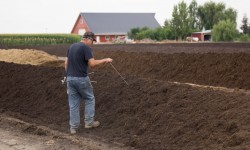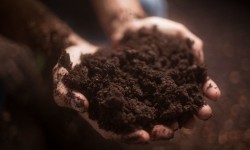Reduced nitrogen loss, increased microbial activity, shorter time till maturity and significantly less odor have all been observed when biochar was used as a compost amendment (Steiner et al., 2010, Khan et al., 2014, Fischer, Glaser, 2012).
Summary
This is perhaps the most efficient place to start with biochar. Where biochar and compost are applied together, the results are generally better than either one alone, and when biochar is added to compost at early stage, the maximum benefit is gained. Biochar’s use in the composting process is mutually beneficial. The composting process can be improved when amended with biochar. The biochar is not diminished during composting, in fact the opposite is true, the biochar becomes improved as well. And the soil where it lands gains the benefit of both. Here are some tips on how to get it right.
Benefits to Compost Process
Reduced nitrogen loss is the most commonly valued benefit. Where biochar is used in composting, it is very common to observe that less nitrogen is lost to the environment (more of it stays in the compost). This can result in a better finished product whose nutrient profile better represents the plant material it was created from, and also has significant environmental benefit when greenhouse gas emissions from composting are reduced.
More nitrate, less ammonia. Consistently we have observed that the finished compost with biochar has significantly greater nitrate and lower ammonia when compared to the same compost not treated with biochar. This corresponds with a pH closer to neutral (rather than alkaline, driven by ammonia). This is suspected to be related to the commonly higher fungal activity and better germination rates found in the biochar treated compost.
Compost has been observed to mature faster with biochar. This is observed as treated v.s. untreated compost showing lower respiration rate, lower ammonia, and higher seedling germination rates. The exact mechanisms for this are not clear, but it is very likely related to biochar’s ability to support microbial activity.
Aeration and moisture buffering. Biochar is a light fluffy material that can hold lots of water. Helping buffer moisture and aeration in compost piles with biochar is a benefit that can be particularly useful with materials that tend to get sticky or sloppy.
Microbial dynamics. Amending compost with biochar tends to result in greater microbial activity in general, with a trend towards fungal dominance.
This is a parallax text block. Click the edit button to change this text.
Benefits to Biochar Characteristics
While helping to improve compost characteristics, the biochar characteristics are also improved. The biochar is not diminished during the compost process, it is improved. The hot, moist, nutrient rich, and microbially active environment leaves a coating on the surface of the biochar, resulting in a more complex, more functional material.
Application Rates
Biochar is not available carbon, but the carbon:nitrogen balance of the pile still serves as a guide towards the right application rate.
- If nitrogen is a limiting factor, only a small amount of biochar is recommended, 5% or less.
- A well balanced compost can benefit from application rates of biochar at 5% to 10% by volume.
- Fresh manure and other high nitrogen materials benefit from higher application rates of biochar; 10% to 20% by volume.
The texture of the compost matters as well. Biochar, when added to a compost pile, can improve aeration and also reduce moisture loss – thus improving microbial activity and possibly maturation rate (Khan, Naser, 2014). Rates for biochar application to compost to improve aeration depend on the texture of the other materials; add biochar till it feels right.
Bibliography
- Reducing Nitrogen Loss during Poultry Litter Composting Using Biochar,, Journal of Environmental Quality, 02/2010, Volume 39, (2010)
- Maturity indices in co-composting of chicken manure and sawdust with biochar,, Bioresource Technology, (2014)
- Synergisms between Compost and Biochar for Sustainable Soil Amelioration,, Management of Organic Waste, Volume Section 10, p.167 – 198, (2012)



